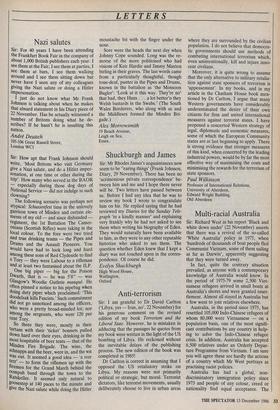Anti-terrorism
Sir: I am grateful to Dr David Carlton (`Libya, yes — Iran, no', 22 November) for his generous comment on the revised edition of my book Terrorism and the Liberal State. However, he is mistaken in adducing that the passages he quotes from my book were written in the light of the US bombing of Libya. He reckoned without the inevitable delays of the publishing process. The new edition of the book was completed in 1985!
Dr Carlton is correct in assuming that I opposed the US retaliatory strike on Libya. My reasons were not primarily political or strategic, but moral. Terrorist dictators, like terrorist movements, usually deliberately choose to live in urban areas where they are surrounded by the civilian population. I do not believe that democra- tic governments should use methods of combating international terrorism which, even unintentionally, kill and injure inno- cent civilians.
Moreover, it is quite wrong to assume that the only alternative to military retalia- tion against state sponsors of terrorism is `appeasement'. In my books, and in my article in the Chatham House book men- tioned by Dr Carlton, I argue that many Western governments have considerably underestimated the desire of their own citizens for firm and united international measures against terrorist states. I have proposed a concerted Western strategy of legal, diplomatic and economic measures, some of which the European Community states are at last beginning to apply. There is strong evidence that stronger measures of this kind, when concerted by the leading industrial powers, would be by far the most effective way of maximising the costs and minimising the rewards for the terrorism of state sponsors.
Paul Wilkinson
Professor of International Relations, University of Aberdeen, Edward Wright Building, Old Aberdeen


































































 Previous page
Previous page